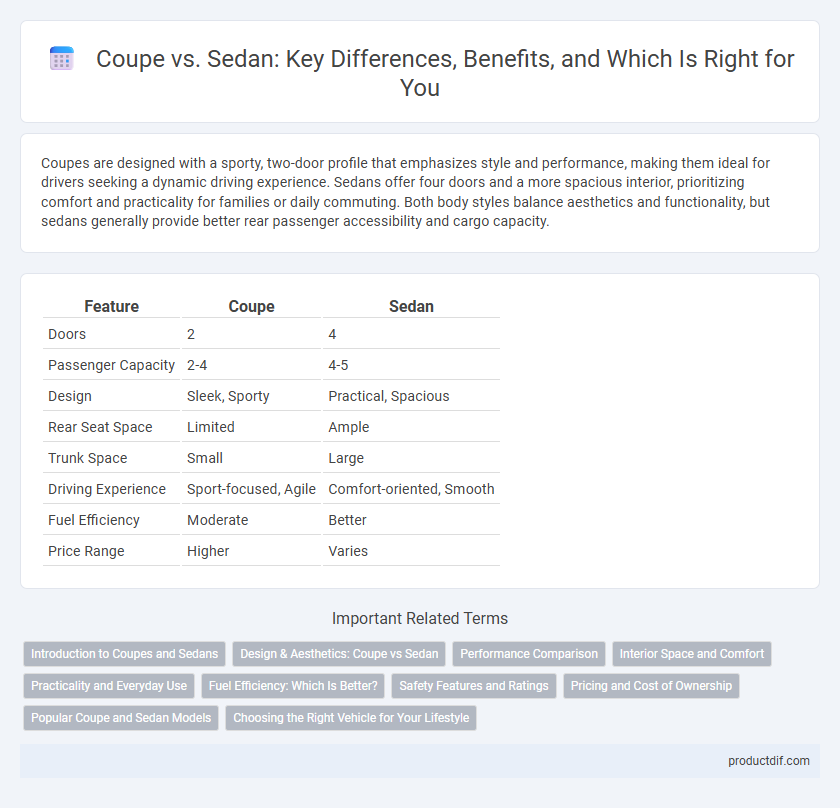Coupes are designed with a sporty, two-door profile that emphasizes style and performance, making them ideal for drivers seeking a dynamic driving experience. Sedans offer four doors and a more spacious interior, prioritizing comfort and practicality for families or daily commuting. Both body styles balance aesthetics and functionality, but sedans generally provide better rear passenger accessibility and cargo capacity.
Table of Comparison
| Feature | Coupe | Sedan |
|---|---|---|
| Doors | 2 | 4 |
| Passenger Capacity | 2-4 | 4-5 |
| Design | Sleek, Sporty | Practical, Spacious |
| Rear Seat Space | Limited | Ample |
| Trunk Space | Small | Large |
| Driving Experience | Sport-focused, Agile | Comfort-oriented, Smooth |
| Fuel Efficiency | Moderate | Better |
| Price Range | Higher | Varies |
Introduction to Coupes and Sedans
Coupes are two-door vehicles designed with a sportier profile and often feature a sleek, aerodynamic shape aimed at performance and style. Sedans typically have four doors and emphasize passenger comfort and practicality, offering more interior space and easier rear-seat access. Understanding these fundamental differences helps buyers choose between the dynamic appeal of a coupe and the everyday functionality of a sedan.
Design & Aesthetics: Coupe vs Sedan
Coupes typically feature a sporty, sleek design with two doors and a sloping roofline that emphasizes aerodynamics and a dynamic appearance. Sedans offer a more traditional, balanced silhouette with four doors, providing a practical yet elegant look suitable for both family and professional settings. The coupe's compact profile caters to style-conscious drivers, while the sedan blends aesthetic appeal with functional comfort.
Performance Comparison
Coupes generally outperform sedans in acceleration and handling due to their lighter weight and sportier suspension tuning. Sedans often prioritize comfort and fuel efficiency, featuring smoother rides and longer range thanks to optimized aerodynamics and larger fuel tanks. High-performance coupe models leverage enhanced powertrains and stiffer chassis for superior cornering and speed on tracks compared to typical sedan configurations.
Interior Space and Comfort
Coupes typically feature a sportier design with reduced rear headroom and legroom, limiting passenger comfort for backseat occupants. Sedans offer more spacious interiors, providing ample headroom and legroom for both front and rear passengers, enhancing overall comfort. Advanced seating materials and ergonomic designs in sedans further contribute to superior long-distance comfort compared to coupes.
Practicality and Everyday Use
Sedans generally offer more practical everyday use due to their spacious interiors and larger trunk capacity, making them ideal for families and daily commuting. Coupes, with their sportier design and two-door configuration, prioritize style and performance but often sacrifice rear-seat space and cargo room. For users valuing convenience and passenger comfort, sedans provide superior functionality and versatility compared to coupes.
Fuel Efficiency: Which Is Better?
Coupes generally offer better fuel efficiency than sedans due to their lighter weight and smaller size, which reduces fuel consumption during city and highway driving. Sedans, while typically heavier and designed for comfort, often have larger engines that consume more fuel, especially in models with all-wheel drive. When comparing specific models, hybrid coupes tend to achieve the highest miles per gallon (mpg), outperforming many traditional sedans in fuel economy.
Safety Features and Ratings
Coupes typically have a sportier design with a stiffer chassis, contributing to enhanced handling but often fewer airbags and limited rear passenger protection compared to sedans. Sedans usually score higher in safety ratings due to larger crumple zones, more extensive safety features like side curtain airbags, and advanced driver-assistance systems (ADAS). Organizations such as the IIHS and NHTSA frequently rate sedans better for crashworthiness and occupant protection than their coupe counterparts.
Pricing and Cost of Ownership
Coupes generally have a higher initial price compared to sedans due to their sportier design and limited production models. Sedans offer lower cost of ownership with better fuel efficiency, more affordable insurance rates, and reduced maintenance expenses. Long-term depreciation tends to be steeper for coupes, making sedans a more economical choice for budget-conscious buyers.
Popular Coupe and Sedan Models
Popular coupe models include the Ford Mustang, Chevrolet Camaro, and BMW 4 Series, known for their sporty design and performance. Leading sedan models such as the Toyota Camry, Honda Accord, and Mercedes-Benz C-Class dominate the market with a blend of comfort, reliability, and advanced safety features. Both vehicle types cater to distinct preferences, with coupes emphasizing style and agility, while sedans prioritize spaciousness and practicality.
Choosing the Right Vehicle for Your Lifestyle
Choosing between a coupe and a sedan depends on your lifestyle needs, with coupes offering sportier design and enhanced performance ideal for solo drivers or couples. Sedans provide more passenger space and practicality, making them well-suited for families and those requiring extra cargo capacity. Prioritize factors like daily commute, passenger requirements, and storage needs to determine the best vehicle type for your routine.
Coupe vs Sedan Infographic

 productdif.com
productdif.com